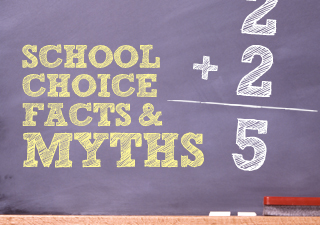Media
Union Think Tank Continues Assault on School Choice
 The union-backed Keystone Research Center (KRC) released a so-called study of Pennsylvania’s Educational Improvement Tax Credit (EITC). Not surprisingly, this study is an attack against tax credits for private scholarships that allow students to leave failing and dangerous public schools, and supports continuing the unsuccessful status quo with more money for public schools.
The union-backed Keystone Research Center (KRC) released a so-called study of Pennsylvania’s Educational Improvement Tax Credit (EITC). Not surprisingly, this study is an attack against tax credits for private scholarships that allow students to leave failing and dangerous public schools, and supports continuing the unsuccessful status quo with more money for public schools.
Here are some facts:
- Testing does not equal accountability. KRC’s report insists that public schools are accountable because they are required to take the PSSA exams and EITC affiliated schools are not, as private schools are not forced to take this particular test. Yet the PSSA inflates performance by 80 percent versus the NAEP exam. Further, when a majority of students score below proficiency on PSSA’s low standard, there is no recourse for parents trapped in these failing schools.
- Real accountability is parental choice. Unlike assigned public schools, families receiving EITC scholarships are able to choose the best school for their child. No school receives any EITC funds unless parents choose that school.
- Scholarship programs are near where people live. KRC’s research points out that scholarship programs are geographically distributed similar to private schools—which match up with the population centers of the state.
- School Choice is improving public schools. KRC refers to improvement in state test scores since 2002. That is to say, academic performance in Pennsylvania increased after the creation of the EITC.
- EITC scholarships serve families with an average income of $29,000. While KRC claims no data on socio-economic characteristics of recipients exists, a 2009 Legislative Budget and Finance Committee Report examines the socio-economic characteristics of recipients, finding that the average family income is well below the program’s limits.
- Families want more EITC scholarships. The demand for scholarships is far greater than what is currently offered, with wait lists for EITC scholarships. For instance, the Children’s Scholarship Fund Philadelphia had 95,000 applications for 7,700 scholarships awarded.
- Private schools are open to students. KRC repeats the claim that private schools will reject students. Yet for 10 years there has been no evidence of widespread cases of families being refused admittance through EITC scholarship. Why? Because when parents have control, they seek the school that is going to best meet their child’s individual educational needs. And as a result, there are all sorts of schools serving the diversity of student needs.
- EITC scholarships are voluntary contributions. KRC refers to EITC scholarships as “diverting taxpayer dollars.” But EITC scholarships are voluntary contributions by businesses that would rather see their money go to support children. In fact, as only 75-90 percent of EITC contributions go towards the tax credit, businesses pay more in taxes plus scholarship contributions by donating than if they had just paid their taxes. In other words, EITC sponsors recognize the value of this program over the traditional government monopoly.
Almost half of the KRC report on the EITC is dedicated to regurgitating talking points about school voucher programs.
- KRC fails to note that there has never been a single study demonstrating that vouchers harmed either voucher students or public schools.
- KRC hides evidence that vouchers improve student performance. Nine of the ten “gold standard” evaluations of voucher programs reported statistically significant gains in achievement for all or some voucher recipients. Students benefiting from school choice in Milwaukee, and Washington, D.C., posted significantly higher graduation rates than conventional public schools.
- KRC glosses over the evidence that vouchers improve public schools. In 18 out of 19 empirical studies, vouchers had a positive impact on public school districts.
- KRC distorts research. They claim, for instance, that a study of the DC Voucher Program shows no benefits. In actuality, that study found graduation rates increased 20 percentage points for students using a voucher, and modest gains in reading for voucher students (with no evidence of impact in math.)
- KRC doesn’t mention the vouchers result in less segregation. Seven empirical studies on voucher programs in Milwaukee, Cleveland and Washington, D.C. find that participating private schools are much less segregated than school districts.
- KRC fails to mentions that vouchers cost considerably less than public school spending. As KRC always argues that more spending will improve public schools, they must also believe more money would improve voucher and EITC performance.
- KRC calls people names. Any researcher that finds academic gains as a result of school vouchers, KRC must stigmatize with a label. These include “conservative,” “voucher advocate,” and even “the Friedman (as in free-market economist ‘Milton’) Foundation”—as though Milton was not his given name, but just a clever ploy.